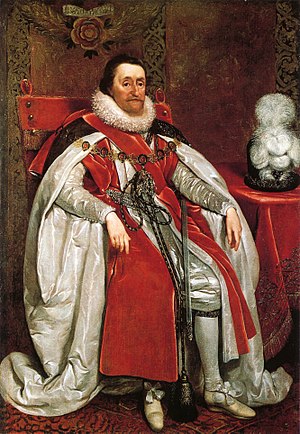Difference between revisions of "James I"
Ross Burgess (Talk | contribs) (Added image from Wikimedia Commons) |
(Book on letters) |
||
| (6 intermediate revisions by 2 users not shown) | |||
| Line 1: | Line 1: | ||
| − | [[File:James I of England by Daniel Mytens.jpg|thumb|right|Portrait of King James by Daniel Mytens, 1621]]'''James Stuart''' ( | + | [[File:James I of England by Daniel Mytens.jpg|thumb|right|Portrait of King James by Daniel Mytens, 1621]]'''James Stuart''' (1566–1625) was King of Scots (as James VI) from the abdication of his mother, Mary Queen of Scots, in 1567, and King of England and Ireland (as James I) from the death of Elizabeth I in 1603. When James was seven months old his father, Henry Stuart, Lord Darnley, was murdered; later that year Mary was imprisoned and forced to abdicate. She never saw him again, and she was eventually executed by order of Elizabeth I in 1587. James had been baptised in the Catholic church, but was brought up a protestant. |
| − | James was married and had seven children (and is the ancestor of all subsequent British monarchs), but was noted for his relationships with men, including Esmé Stewart (Duke of Lennox), Robert Carr (Earl of Somerset) and [[George Villiers]] (Duke of Buckingham). "His habit of fondling [his young favourites], and especially Buckingham, in public gave rise to suspicions of baser intimacies in private, but these are not proved."<ref>Godfrey Davies, <cite>The Early Stuarts</cite> (Oxford History of England), 1937, p 2</ref> However James's book <cite>Basilikon Doron</cite> condemns [[sodomy]] as a crime "ye are bound in conscience never to forgive". | + | On James's accession to the English throne there was a saying <em>Rex fuit Elizabeth, nunc est regina Jacobus</em> (Latin for "Elizabeth was King, now James is Queen"). The start of his reign was marked by the failed Gunpowder Plot (Guy Fawkes was discovered with barrels of gunpowder in the cellars of the Houses of Parliament, 5 November 1605). |
| + | |||
| + | ==The King James Bible== | ||
| + | |||
| + | James's lasting legacy is the Authorised Version (or King James Version) of the Bible, published 1611. | ||
| + | |||
| + | ==Relationships== | ||
| + | |||
| + | James was married and had seven children (and is the ancestor of all subsequent British monarchs), but was noted for his relationships with men, including [[Esmé Stewart]] (Duke of Lennox), [[Robert Carr]] (Earl of Somerset) and [[George Villiers]] (Duke of Buckingham). "His habit of fondling [his young favourites], and especially Buckingham, in public gave rise to suspicions of baser intimacies in private, but these are not proved."<ref>Godfrey Davies, <cite>The Early Stuarts</cite> (Oxford History of England), 1937, p 2</ref> However James's book <cite>Basilikon Doron</cite> condemns [[sodomy]] as a crime "ye are bound in conscience never to forgive". David Bergeron's (1999) book 'King James and letters of erotic desire' was listed in LGBT History Month 2024 as one of seven books recommended by [[LSE]] librarian Heather Dawson <ref> https://blogs.lse.ac.uk/lsereviewofbooks/2024/02/05/seven-recommended-reads-for-lgbt-history-month-2024/ (accessed 6 February 2024) </ref>. | ||
==References== | ==References== | ||
| Line 7: | Line 15: | ||
[[Category:British rulers]] | [[Category:British rulers]] | ||
| + | [[Category:1566 births]] | ||
| + | [[Category:1625 deaths]] | ||
Latest revision as of 22:16, 6 February 2024
James Stuart (1566–1625) was King of Scots (as James VI) from the abdication of his mother, Mary Queen of Scots, in 1567, and King of England and Ireland (as James I) from the death of Elizabeth I in 1603. When James was seven months old his father, Henry Stuart, Lord Darnley, was murdered; later that year Mary was imprisoned and forced to abdicate. She never saw him again, and she was eventually executed by order of Elizabeth I in 1587. James had been baptised in the Catholic church, but was brought up a protestant.On James's accession to the English throne there was a saying Rex fuit Elizabeth, nunc est regina Jacobus (Latin for "Elizabeth was King, now James is Queen"). The start of his reign was marked by the failed Gunpowder Plot (Guy Fawkes was discovered with barrels of gunpowder in the cellars of the Houses of Parliament, 5 November 1605).
The King James Bible
James's lasting legacy is the Authorised Version (or King James Version) of the Bible, published 1611.
Relationships
James was married and had seven children (and is the ancestor of all subsequent British monarchs), but was noted for his relationships with men, including Esmé Stewart (Duke of Lennox), Robert Carr (Earl of Somerset) and George Villiers (Duke of Buckingham). "His habit of fondling [his young favourites], and especially Buckingham, in public gave rise to suspicions of baser intimacies in private, but these are not proved."[1] However James's book Basilikon Doron condemns sodomy as a crime "ye are bound in conscience never to forgive". David Bergeron's (1999) book 'King James and letters of erotic desire' was listed in LGBT History Month 2024 as one of seven books recommended by LSE librarian Heather Dawson [2].
References
- ↑ Godfrey Davies, The Early Stuarts (Oxford History of England), 1937, p 2
- ↑ https://blogs.lse.ac.uk/lsereviewofbooks/2024/02/05/seven-recommended-reads-for-lgbt-history-month-2024/ (accessed 6 February 2024)
